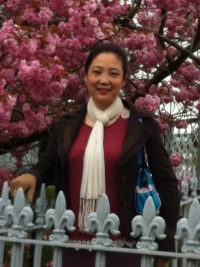About Acupuncture
Acupuncture works to help maintain your body's equilibrium. It involves the insertion of very fine needles into specific points on the body to regulate the flow of 'Qi', your body's vital energy. For a number of lifestyle and environmental reasons, Qi can become disturbed, depleted or blocked, which can result in some symptoms of pain and illness. Traditional acupuncture can often be an effective therapy to help restore balance and promote physical and emotional harmony.
Treatment is aimed at the root of your condition as well as your main symptoms. This approach helps with resolving your problem and enhancing your feeling of wellbeing. You may notice other niggling problems resolve as your main health complaint improves.
Many people come to acupuncture for help with specific symptoms or to relieve specific pains like osteoarthritis of the knee. Some use acupuncture because they feel generally unwell but have no obvious diagnosis. Others choose acupuncture simply to enhance their feeling of wellbeing. Acupuncture is considered suitable for all ages including babies and children. It can be used effectively alongside conventional medicine.
One of the most popular myths surrounding acupuncture is the size of the needle used in treatment. In fact new research revealed that 21% of the British public think an acupuncturist’s needle is as large as that used in an injection. The reality is acupuncture needles are actually the same width as a human hair and some are just 0.13mm in diameter. Most people might feel a slight tingling sensation when the needles are used, but this certainly does not feel like the pain associated with an injection.
F requency and length of treatment depends on your individual condition. Some change is usually felt between 4 - 6 treatments, although occasionally only 1 or 2 are required. These are usually at weekly intervals. Some patients may benefit from longer term treatment.
What conditions can Acupuncture help with?
Yan Zeng practices acupuncture based on Chinese medicine principles that have been developed, researched and refined for over 2,000 years. Acupuncture is now widely used and accepted all over the world. In the UK, more and more people are finding out what acupuncture can do for them.
Acupuncture can be used to help a vast array of health conditions, including:
Addiction - e.g. weight loss, smoking, alcoholism
Dermatological Disorders - e.g. eczema, acne
Internal Disorders - e.g. migraine, thyroid problems, asthma, hypertension, digestive problems, IBS, liver/kidney support, heart problems
Muscles & Skeletal Problems - e.g. arthritis, back pain, sciatica
Neurological Disorders
Mental Health Issues - e.g. stress management, anxiety, relaxation
Eye, Ear, Nose & Throat Problems - e.g. sinusitis, allergies, glaucoma
Detox
Infertility
Cancer Support
Immune System Support
What to expect at your first Acupuncture appointment
Acupuncture has a very good track record. The needles used are single use, sterile and disposable. Responses to treatment may sometimes include tiredness or mild dizziness and on occasion minor bruising may occur. However all such reactions are short lived.Do let your practitioner know if you are completely new to acupuncture so they can take extra time to explain what happens and ensure you are comfortable with the process.
During your first visit your the acupuncturist needs to gain a thorough understanding of your main complaint and your general health and lifestyle. This involves asking questions about your current symptoms and your medical history, as well as such things as your sleeping pattern, your appetite and digestion, and your emotional wellbeing. Women are also asked about their menstrual cycle and any past pregnancies and childbirth.
You might feel that some questions appear unrelated to your condition but the information you give helps your practitioner to form a more complete picture of your health and lifestyle. Your acupuncturist will also take your pulse on both wrists and may examine your tongue and feel for areas of muscular tension or pain.
Try not to have a large meal within an hour of your appointment as the process of digestion will alter the pattern of your pulse, and you may need to lie on your stomach. You should also avoid alcohol and food or drink that colours your tongue such as coffee or strong tea. It is a good idea to wear loose-fitting clothes so that the acupuncture points, especially those on your lower limbs, are easily accessible.
Most people find acupuncture relaxing and often feel very calm after a treatment. You may feel a little tired or sleepy and should take this into account if you are planning to drive or use heavy machinery straight after your treatment. You should refrain from vigorous exercise after treatment and, ideally, give yourself a little time to rest. It is also advisable not to drink alcohol for several hours after treatment. Acupuncture has very few side effects and any that do occur are usually mild and self-correcting. Such bruising is painless and generally clears within a day or two.
About Yan Zeng
Yan Zeng is a Traditional Chinese Medicine and Acupuncture Doctor with over 15 years experience in the Chinese Medicine and Acupuncture field. She graduated from the Cheng Du Traditional Chinese Medicine University, Si Chuan in 1993, specialising with a Masters Degree in Acupuncture, graduating for a second time in 1996. She currently runs a long established Clinic at Friars Vennel in Dumfries in addition to her satellite clinic here in Moffat.
Yan Zeng is a full member of the Association of Traditional Chinese Medicine (UK). All registered members of the Association are bound by the code of ethics and the Code of Practice of the Association to uphold the highest standards of Chinese Medicine.
Yan Zeng is passionate about her role in helping her patients to overcome physical or psychological illness and relishes the opportunity to help them on their way to recovery.
Consultation Prices
Initial consultation - 1hr 15 mins - £60
Follow up - 45 mins - £45
Useful Links
Association of Traditional Chinese Medicine





